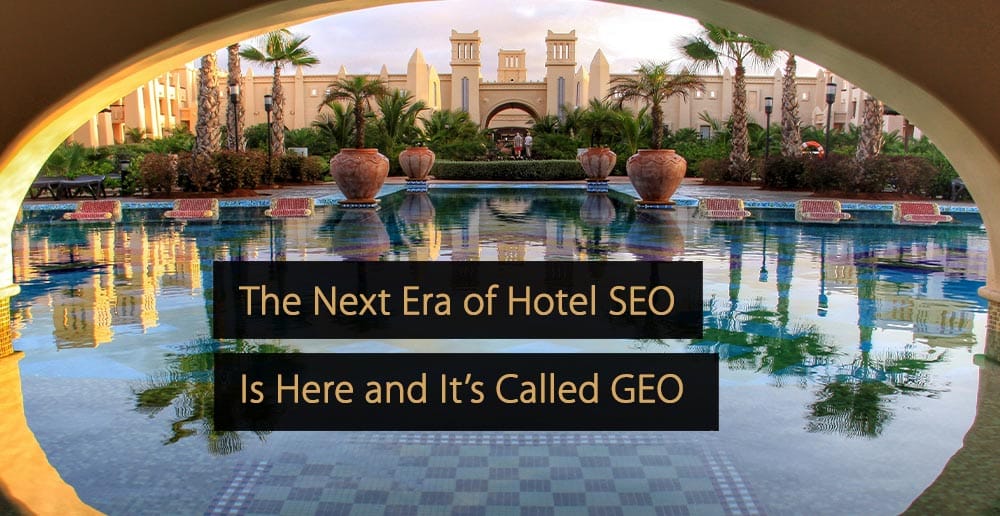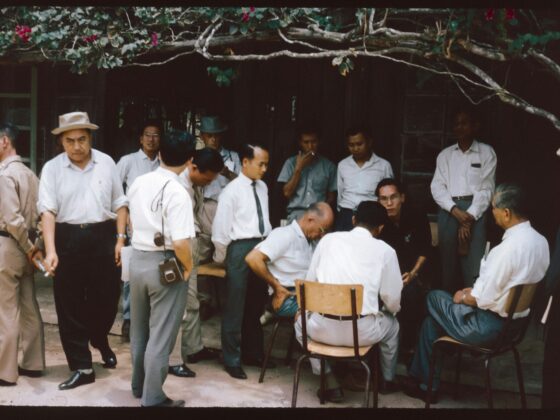
Planning a trip often involves juggling multiple platforms. Travelers typically bounce between online travel agencies, metasearch engines, and Google in search of the perfect hotel. But that process is changing. Today, nearly 30% of travelers have used generative AI (GenAI) tools (1), like ChatGPT, Gemini, and Perplexity, to plan a trip. These platforms are designed to deliver curated recommendations, and very soon, they’ll allow travelers to book directly within the conversation.
The New Visibility Game for Hotels in a Smart Search World
For hotels, this shift marks a new era. It’s no longer enough to just rank on Google or be listed on OTAs. To be recommended by AI, hotels must invest in generative engine optimization (GEO), a strategy focused on citations, content authority, and a strong presence across multiple online channels.
In this article, we’ll explore what exactly GEO is, how it differs from traditional SEO, and what steps hotels can take to stay visible in the AI-powered era of travel planning.
What is GEO?
GEO is the practice of improving your hotel’s visibility in AI-generated recommendations. Unlike traditional search engine optimization (SEO), which focuses on ranking in search engine results pages, GEO is about being referenced and recommended by generative AI tools.
These AI engines don’t just crawl websites and rank them by keyword relevance; they generate answers by pulling from a wide range of sources across the internet.
From Keywords to Citations: How AI Evaluates Content
Traditional SEO is centered around keywords. You optimize your website for phrases like “best boutique hotels in Barcelona” and aim to appear on page one of Google. At the same time, you make sure your hotel is listed on OTAs and metasearch platforms to cover as many discovery channels as possible.
GEO works by aligning your hotel’s digital presence with the types of content AI engines trust. These engines synthesize responses using citations from sources like OTAs, hotel websites, travel blogs, forums, and even video content. Some citations appear directly in responses, while others are used behind the scenes to train and validate answers.
Cloudbeds’ recent study, The Signals Behind Hotel AI Recommendations, revealed the types of citations (or sources) that generative AI platforms rely on most when recommending hotels. The top sources included:
- Online travel agencies: Over 55% of all citations came from OTAs, including global players like Booking.com and niche platforms.
- Hotel websites: 6% of citations came directly from official property websites.
- Travel blogs:2% of citations were from independent or media-run travel blogs.
- Community forums: 6% came from platforms like Reddit and Tripadvisor.
- YouTube:6% of citations originated from video content and reviews.
It’s not just about being mentioned, it’s about how consistently and positively your brand is portrayed. AI engines appear to assess sentiment when reviewing these sources, analyzing guest feedback to identify patterns.
The GEO Playbook for Hotels
There’s no single tactic that guarantees your hotel will be recommended by AI engines. Visibility in generative search is the result of a well-rounded strategy built on consistency, authenticity, and a strong digital presence.
Here are the core areas to focus on:
1. Ensure You’re Listed on the Right OTAs
OTAs remain the most cited source in AI recommendations due to their abundance of structured, real-time data like rates, availability, and guest reviews. Therefore, it’s important to be listed on a mix of major platforms, like Booking.com and Expedia, as well as niche OTAs relevant to your target audience, whether that’s adventure travel or luxury stays.
Make sure your hotel name, description, and branding are consistent across every listing as AI engines look for clarity and alignment across sources, and discrepancies can weaken your credibility.
2. Don’t Neglect Your Hotel’s Website
Your website is one of your most valuable digital assets. It should contain all of the information AI engines—and travelers—are looking for: room details, amenities, policies, booking options, FAQs, guest reviews, and high-quality images. Structured formatting helps AI better understand your content, so prioritize clear headers, bullet points, and concise descriptions.
Technical performance also plays a role. Ensure your site is mobile-friendly, fast-loading, and free of broken links. Use proper meta tags, alt text for images, and schema markup where possible. A built-in booking engine is key, not only to drive direct bookings but to stay competitive as AI platforms begin integrating booking capabilities.
3. Earn Citations through Partnerships
Citations are at the core of GEO. To earn them, you must look beyond your owned channels. Collaborate with travel bloggers, influencers, destination marketing organizations, and local media, and participate in events, campaigns, or storytelling initiatives that position your property as a valuable and reference-worthy source.
For example, being listed in articles or vlogs for ‘Top 10 hotels in [your destination]’ helps improve credibility in highly relevant contexts.
Building brand awareness through PR and influencer partnerships increases the likelihood of being mentioned across platforms that AI engines trust, strengthening your overall authority and visibility.
4. Embrace User-Generated Content
User-generated content offers valuable signals of credibility and authenticity. To increase your mentions online, encourage guests to leave reviews on Tripadvisor, Google, and OTAs. Consider encouraging guests to mention specific details about your property in reviews, as this kind of context helps AI engines better understand what your hotel is known for.
For example, if guests post about your stunning rooftop patio or kid-friendly pool, AI will be able to pull from these reviews when users ask specific queries around these topics.
It’s also important to keep an eye on Reddit threads, Facebook groups, and travel forums where your hotel is mentioned. These communities often surface organically in AI-generated responses and can impact recommendations. Be sure to respond to threads or negative reviews to provide context around conversations happening online.
Seo Isn’t Dead, It’s Evolving
SEO as we know it isn’t going away—but it is evolving. The rise of generative AI is expanding the playing field, requiring hotels to optimize not just for Google but for a growing number of platforms that influence traveler decisions.
GEO represents the next phase of visibility. Hotels that adapt will benefit from stronger digital presence, more AI-driven referrals, and ultimately, more bookings.
As we move toward a future shaped by agentic AI, where travelers can ask, decide, and book within a single interaction, a well-rounded, citation-rich digital footprint won’t just be helpful—it will be essential.
The next time a traveler asks ChatGPT for a place to stay in your city, make sure your hotel is part of the answer.
Free Report: The PMS UX Report – User-Friendly Design Drives Success
The PMS User Experience Report explores how user-friendly property management systems impact hotel staff efficiency, training, and retention. Based on a survey of 500 employees, it highlights key challenges and the role of intuitive design in improving hospitality operations.
Click here to download the report “The PMS User Experience Report – How User-friendly UX Drives Success”.
More Tips to Grow Your Business
Revfine.com is the leading knowledge platform for the hospitality and travel industry. Professionals use our insights, strategies, and actionable tips to get inspired, optimize revenue, innovate processes, and improve customer experience.
Explore expert advice on management, marketing, revenue management, operations, software, and technology in our dedicated Hotel, Hospitality, and Travel & Tourism categories.
Source:






